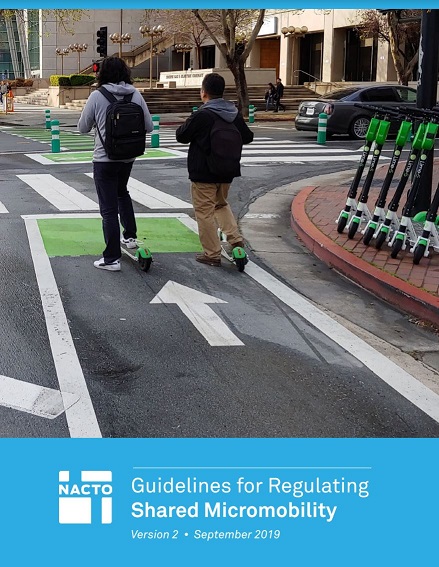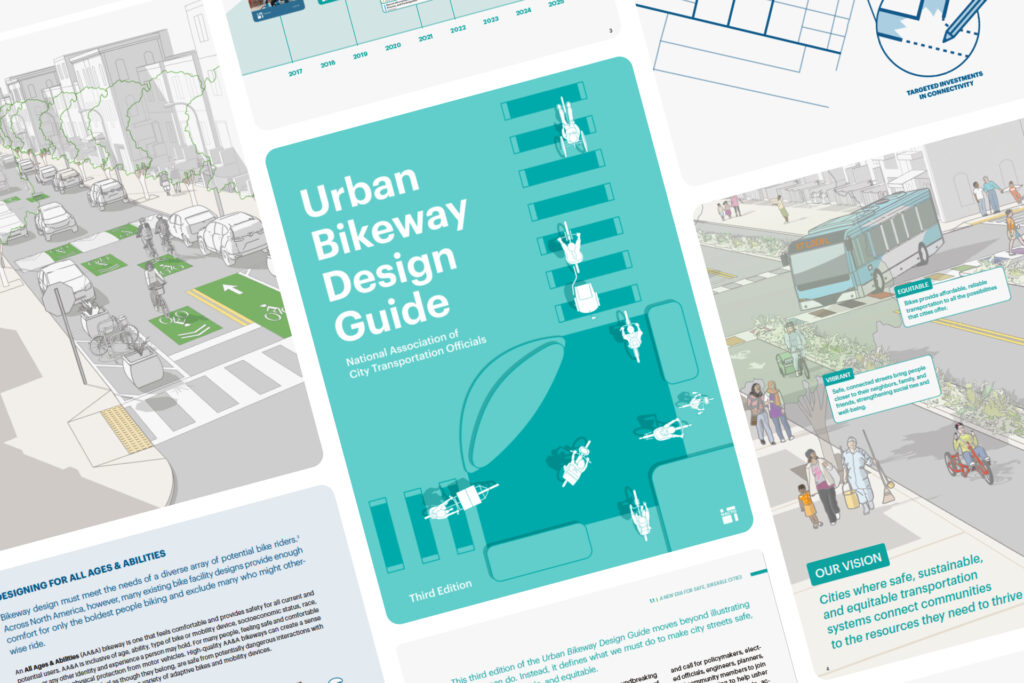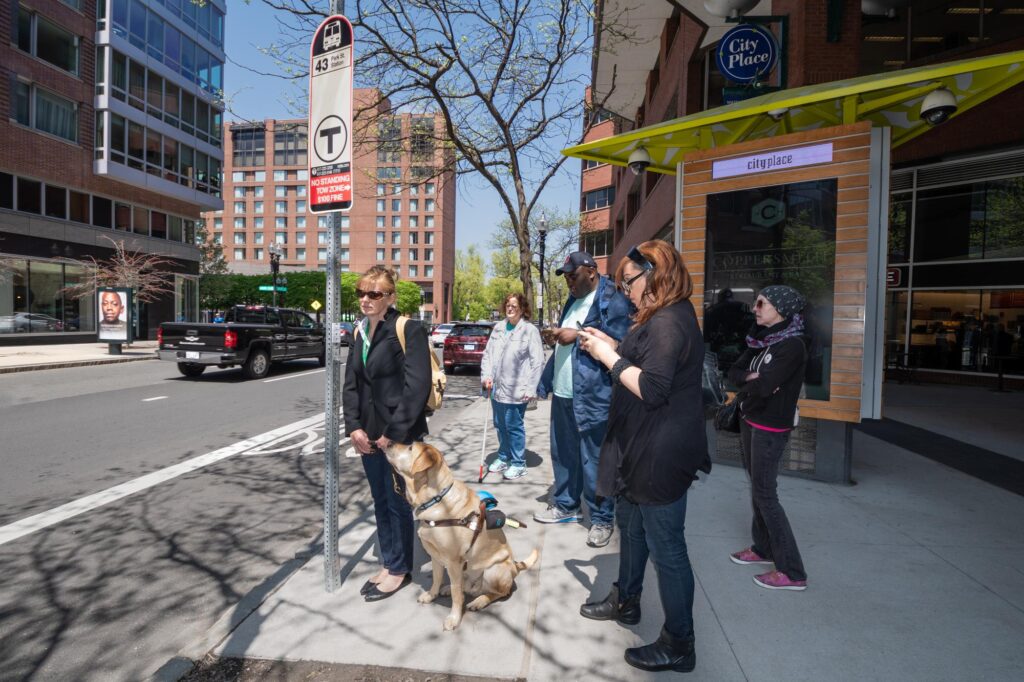With 84 Million Trips Taken on Shared Bikes and Scooters Across the U.S. in 2018, Guidance Codifies Best Practices for Achieving City Goals and Maximizing Public Benefit
For Immediate Release | September 11, 2019
Contact: Alexander Engel | [email protected] | 646-568-0747 (m)

(Toronto) The National Association of City Transportation Officials (NACTO), today released updated city-developed comprehensive guidance to help cities regulate and manage shared micromobility (shared bikes and scooter) companies. Developed by a steering committee of NACTO’s 81 member cities and transit agencies, the updated NACTO Guidelines for Regulating Shared Micromobility takes lessons learned from the first full year of shared scooters operating on city streets across the U.S., as well as city experience with dockless pedal bike and dockless e-bike programs.
The rapid growth in the number of shared micromobility trips and the introduction of e-scooters has required cities to focus new attention on how best to regulate these new services in order to achieve the best public outcomes. NACTO’s guidance covers:
- Options for regulation, including permits, pilots, and demonstrations;
- General provisions that should be included in all agreements with providers, such as insurance requirements, and when an operator is to be considered in breach of its agreement with a city;
- Infrastructure investments, including device parking options such as on-street corrals and docking points, and guidance on providing safe places to ride;
- Best practices on operational requirements, including fleet size, device relocation, rebalancing and fleet distribution, equipment and vehicle maintenance, customer service, and staffing;
- Safety provisions, including vehicle speed, battery practices, and parking options that preserve the public-right-of-way;
- Best practices for equity, including increased access to underserved communities;
- Fee structures that enable cities to recoup their costs for managing dockless mobility in their cities, as well as provide public benefits;
- Public engagement, including outreach materials, as well as pricing and discount programs;
- Data management, including how cities can ensure access to accurate, high-quality data while maintaining individual privacy;
- Technology recommendations, including the best uses for geofencing technology along with its limitations.
Many of the best practices include dynamic recommendations that encourage operator behavior that benefits city goals, such as shifting trips to low-carbon modes or providing mobility options for underserved communities. Flexible permitting structures with incentive-based performance clauses enable better outcomes for cities and the public.
“With over 37,000 scooters and dockless bikes, along with over five million trips taken on them, Los Angeles has been quick to build tools to enable us to keep up with innovation,” said Seleta Reynolds, General Manager of the Los Angeles Department of Transportation and NACTO President. “NACTO’s guidance provides crucial steps for cities to ensure that new mobility options benefit the public good, from best-practice data management to real-world examples on coordinating across neighboring municipalities.”
“From docked and dockless bike share to scooters and more, Austin is fortunate to have access to a network of like-minded cities tackling similar issues on their streets,” said Robert Spillar, Director of the Austin Transportation Department and NACTO Treasurer. “As we’ve seen five million trips taken on scooters in Austin just last year, NACTO’s collaboration on micromobility has proven invaluable. We are excited to contribute to this body of knowledge with our peers.”
“The City of Atlanta is rethinking mobility from the ground up: from rolling out safer streets for all to delivering our first ever strategic plan and Department of Transportation,” said Jacob Tzegaegbe, Atlanta’s Senior Transportation Policy Advisor. “The NACTO network and this new shared bike and scooter guidance will help us on every step of the way. By sharing proven best practices, we can maximize our transportation resources to keep Atlantans moving and keep Atlantans safe.”
“Offering safe, sustainable and modern transportation options to residents and visitors of Toronto is one of our most important priorities,” said Barbara Grey, General Manager, Transportation Services, City of Toronto. “All cities can benefit from the guidelines and best practices provided by NACTO to help ensure current and future micromobility programs are safe and successful.”
“The exceptional growth of shared micromobility shows that we’re in a space of constant innovation,” said Waffiyah Murray, Better Bike Share Program Manager, City of Philadelphia. “Cities must be intentional about ensuring that the benefits of this change reach low income and communities of color in ways that previous new transportation paradigms haven’t. From providing affordable service to creating and supporting living wage jobs the regulation and management of shared micromobility can enable the opportunity for both economic and social growth.”
“Shared micromobility can provide multiple benefits to cities including more affordable and accessible mobility while also reducing congestion and pollution,” said Lina Fedirko, Senior Associate, ClimateWorks Foundation. “NACTO’s recently updated Guidelines for Regulating Shared Micromobility puts forth a refined view on regulatory actions for cities which, when coupled with support for deployment, including safe public infrastructure, can ensure we strike the right balance and maximize the benefits of these promising new modes of travel.”
In addition to best practice recommendations, NACTO’s Guidelines for Regulating Shared Micromobility includes an appendix of current states of practice, giving a fuller national picture for how dockless mobility is currently managed and regulated today.
NACTO’s Guidelines for Regulating Shared Micromobility was made possible by ClimateWorks Foundation and the Better Bike Share Partnership and can be downloaded for free at nacto.org/sharedmicromobilityguidelines.
###
About the National Association of City Transportation Officials (NACTO)
NACTO is an association of 81 major North American cities and transit agencies formed to exchange transportation ideas, insights, and practices and cooperatively approach national transportation issues. The organization’s mission is to build cities as places for people, with safe, sustainable, accessible, and equitable transportation choices that support a strong economy and vibrant quality of life.


